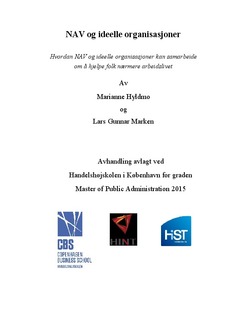| dc.description.abstract | This thesis addresses the cooperation between the Norwegian labor and welfare administration, NAV and nonprofit organizations. We have tried to figure out whether the two stakeholders are interested collaborate in the aim to solve social problems, and what critical factors that must be present in order to succeed.
We have carried out a research process doing a survey sent to 150 leaders in NAV and 50 leaders of nonprofit organizations that have cooperated with NAV.
On the basis of the answers we can say with great certainty that NAV and nonprofit organizations want to cooperate to solve social problems. Both stakeholders have an interest in working together for integrating immigrants, activate unemployed people and measures for drug addicts. They both have a strong desire to take responsibility and contribute to the local community. A large majority say they are dedicated to a common overarching objective within social work.
Besides joint statement of objectives is the main basis for this type of cooperation small cultural differences between the organizations, a reciprocal social obligation and relational contracts based on trust and a minimum of formalities.
The theoretical perspective we have chosen is stakeholder analysis, institutional theory and theory of public-private partnerships with emphasis on social work.
“Everyone wants cake but no one wants to make it” says the director of the association that organizes most of the non-profit organizations in Norway, when she talks about the attitude of leaders in the public sector towards collaboration with nonprofit organizations. This saying can also be valid for leaders of NAV. We do not believe that political signals and positive attitude towards cooperation among leaders is enough. Therefore we have some recommendations to the political authorities and superior level in NAV about how they can stimulate NAV leaders to try nonprofits as partner.
Avhandlingen dreier seg om samarbeid mellom NAV-kontor og ideelle organisasjoner. Vi har undersøkt om de to partene er interessert i et samarbeid og hvilke kritiske faktorer som må være til stede for å lykkes med dette.
En spørreundersøkelse gikk ut til 150 NAV-ledere og 50 ledere av ideelle organisasjoner som har hatt et samarbeid med NAV.
På bakgrunn av svarene kan vi med stor sikkerhet si at NAV og ideelle organisasjoner ønsker et samarbeid. Begge parter har interesse for et samarbeid om integrering av innvandrere, aktivisering av arbeidsledige og tiltak for rusmisbrukere. Ønsket om å ta samfunnsansvar, gjøre noe meningsfullt og bidra i lokalsamfunnet er en viktig drivkraft. Et stort flertall sier de kan dedikere seg til å jobbe med felles overordnede mål innenfor sosialt arbeid.
Foruten felles målformulering er det viktigste grunnlaget for denne typen samarbeid små kulturelle forskjeller mellom aktørene, en gjensidig sosial forpliktelse og relasjonelle kontrakter basert på tillit og et minimum av formaliteter.
Det teoretiske perspektiv vi har valgt er interessentanalyse, institusjonell teori og teori om offentlig privat samarbeid med vekt på sosialt arbeid.
«Alle vil ha kake men ingen vil bake». Det sier leder for paraplyorganisasjonen Frivillighet Norge når tema er ledere i offentlig sektor sitt forhold til samarbeid med ideelle organisasjoner. Det kan også gjelde lederne i NAV. Vi tror ikke politiske ønsker og positiv innstilling til samarbeid hos lederne er nok. Avhandlingen rundes derfor av med noen anbefalinger til politiske myndigheter og Arbeids- og velferdsdirektoratet om hva som skal til for at NAV-lederne i større grad tør å prøve ideelle organisasjoner som samarbeidspartner. | nb_NO |
